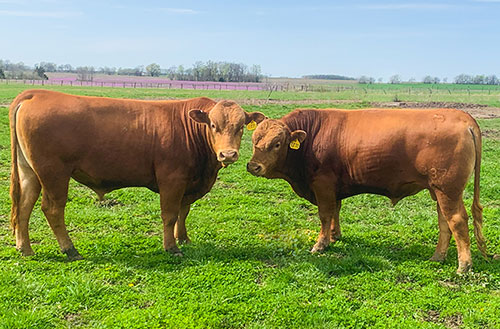Our Beef

Over the last twenty-five years, there has been a concentrated effort on the Callis Farm to improve beef quality. We have used carefully selected Angus sires for improved marbling and overall carcass quality. Our cattle have consistently performed well above industry standards for quality when graded by the United States Department of Agriculture (USDA).
We purchased our first group of Akaushi cattle in 2018 after a visit to Heartbrand Ranch in Harwood, Texas. Akaushi is one of the four breeds of Japanese Wagyu cattle. The breed is known for its outstanding beef quality and health benefits. We immediately started a crossbreeding program with our Angus and Akaushi cattle and are pleased to offer the finished product today.
In addition to superior quality, Akaushi beef offers several health benefits. Akaushi beef has a higher concentration of monounsaturated fat relative to saturated fat. The American Heart Association (AHA) notes this ratio can lead to lower cholesterol, prevention of coronary heart disease, and weight loss. It is also a significant source of oleic acid, the compound found in olive oil that the AHA touts as good for the heart.
Bar C Meat Company recognizes the importance of safe and humane management practices. Our cattle are NEVER given any artificial growth hormones. They are raised by their mothers in grass fields and finished on a high-energy, corn-based diet. We graze our cattle in segmented pastures and employ rotational grazing to improve and conserve soil, plant, and animal health.
Rotational grazing is the process of dividing larger parcels of land into smaller plots and moving the cattle frequently. The cattle graze in one spot while the other pastures “rest”. Resting pastures allows the plants to recover and grow above and below ground which benefits both the plant and the soil. This makes a healthier plant with improved photosynthesis which increases available forage. This process also aids in water infiltration and slows runoff, which limits soil erosion and preserves the health of our local streams.
Cattle spend the winter in different pastures each year so that nutrients can be evenly distributed between pastures, which limits our dependence on commercial fertilizer. Our cattle also drink fresh well water in most pastures.
We are happy to accept your order online.